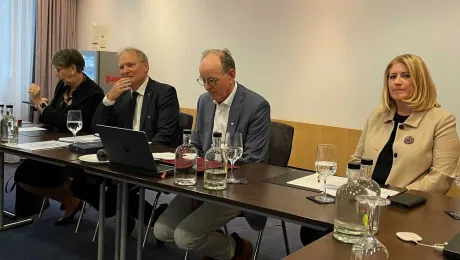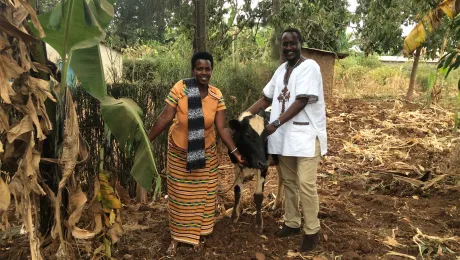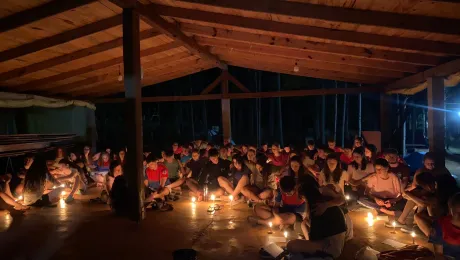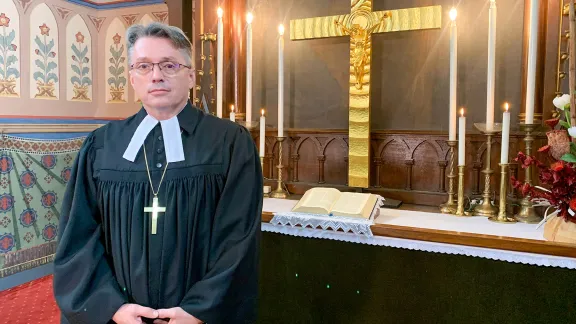
Bishop Novak in his church in Murska Sobota. Photo: ECACS
Leon Novak, Bishop of the Evangelical Church of the Augsburg Confession in Slovenia
(LWI) – We meet Bishop Leon Novak in Kyiv during an exceptional service at St Catherine's Lutheran Church. He has just driven 1,439 kilometers in a van to bring aid supplies from the churches in Slovenia to Kremenchuk in Ukraine, where they will be distributed to the Lutheran congregations.
In this Voices from the Communion, Bishop Novak talks about revitalizing churches after the COVID pandemic, humanitarian assistance for the churches in Ukraine and why Reformation Day is widely celebrated in a country with less than one percent Lutherans.
How would you describe your church?
The Evangelical Church of the Augsburg Confession in Slovenia is a diaspora church – its members account for less than one percent of the total population of Slovenia. Our church has so far had 14 parishes, but in September 2023, two Pentecostal congregations joined us. Now, we have 16 parishes and 12 pastors − 8,500-9,000 contributing members and about 12,000 members altogether.
We are a traditional people's church with strong ties to the Reformation. Reformation Day is a national holiday in Slovenia, and this public holiday is marked by a state ceremony broadcast on national television. The president, members of the government, diplomats, and other representatives of politics and the economy attend this ceremony.
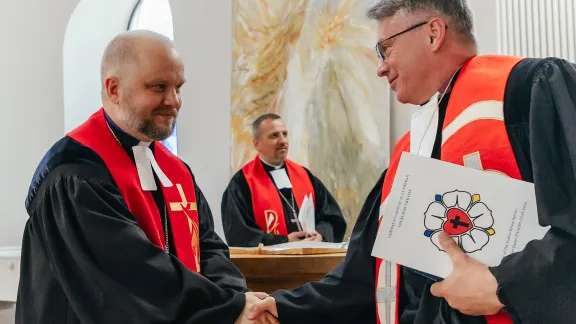
Bishop Leon Novak and Ukrainian Bishop Pavlo Shvarts share the peace at the festive service in St. Catherine’s Lutheran church, Kyiv. Photo: LWF/ Anatolyi Nazarenko
We must thank the Slovenian Reformer Primož Trubar for that. He laid the foundation for the standard Slovene language by translating the New Testament. In 1550, he began by publishing the Slovenian Catechism and the Abecedarium, which was the first book printed in Slovene, followed by the New Testament. Juri Dalmatin translated the whole Bible in 1584 and printed it then.
Reformer Trubar not only shaped the Protestant church in Slovenia but also our national identity. That is why, when Slovenia became independent in 1992, the government introduced Reformation Day as a national holiday. Seeing that we make up less than one percent of the population, that is really something.
How did you become a pastor?
I grew up in a pastor's family – my father was a so-called Senior, an Evangelical Church leader in what was then Yugoslavia. So, I also decided to become a pastor and study theology in Vienna. There, I also met my wife Elisabeth, who comes from Burgenland in Austria and studied Protestant theology, amongst other subjects. After our wedding, we moved to Slovenia, and I took up my first pastorate in Murska Sobota, in northeast Slovenia. That is the youngest Slovenian parish with 2,200 members. I am still a pastor there today and now exercise the ministry of the bishop as well.
Has your parish changed since the time of Yugoslavia?
No, the number of members has remained stable. However, after the COVID-19 pandemic, we noticed that people had lost the habit of attending church during this time. Now, we must revive the attendance at church services and, in a way, engage in Home Mission so that people attend worship services again and participate in congregational life.
How do you go about this?
On the one hand, we hold worship under different themes. Then we vary with the songs: Half of the worship services include classical old hymns, and in the rest we sing modern songs of praise. We also have two music groups with singers . At the same time, we hold Sunday School so the children can enjoy a program suited to their age.
We are also trying to step up our ministry for young people after confirmation. On the main church holidays, we hold special services. For example, at Pentecost, we organize a picnic because that is the church's birthday. We invite non-churchgoers to this service and the picnic as well. The proceeds then go to a specific diaconal project.
Our congregation has a pastor (me), a female pastor (40%), and a volunteer preacher. We take turns preaching, allowing for various thoughts, styles of proclamation, and a special dynamic in the services.
During the COVID -pandemic, we broadcast services on regional television for the older generation and sick people who could no longer attend. We chose regional TV because it corresponds to their viewing habits, and they know how to switch on the TV. We tried using YouTube for remote worship but soon realized that this medium does not work for that particular group of people.
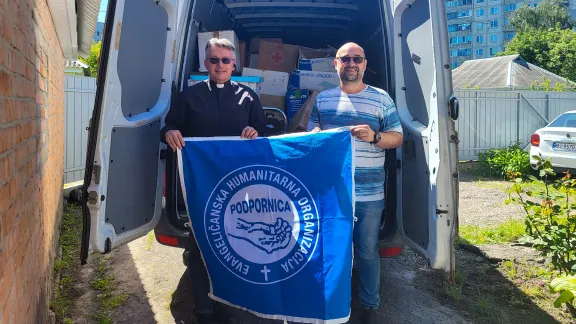
Bishop Novak with a delivery of relief goods to Krementchuk, Ukraine. Photo: ECACS
You have experienced Yugoslavian communism, then the wars when the country fell apart, and now the war in Ukraine. How has this eventful history shaped you?
When you have experienced something like that yourself, you can understand the situation in another country much better; you have experienced yourself how helpless you are in a war and how precious it is to have friends, brothers, and sisters who do not forget you in times of need and who do not leave you alone.
Through the support from our parishes and our small-scale diaconal ministries in Slovenia (we only have a staff of three), I can take relief goods to Ukraine. I now have come here for the fifth time.
How do you do that in practical terms?
We organize these aid deliveries in consultation with the German Evangelical Lutheran Church in Ukraine; that means we collect articles that are needed: generators, winter clothing, wheelchairs, and crutches, which we then take to a hospital or hospital beds for home care of the elderly and infirm.
We collect items in the parishes and often receive help from the German Protestant agency Gustav-Adolf-Werk and other organizations abroad. I then pick up all the relief goods and drive them in a small van. That way, I can still pass customs in the car lane. With a bigger vehicle I would have to wait in line with the trucks, which takes six to eight hours longer. So, I get through quickly and bring the aid to Odesa, Kharkiv, or elsewhere.
Are you not afraid?
So far, I haven't been afraid. Once, I was in Kharkiv, and there were missile attacks; they destroyed the electricity infrastructure, and there was a general power outage. I then drove on to Odesa during daylight. I always drive myself because there is a risk involved. I wouldn't like people to get the impression that the bishop sits safely in his office and lets other people drive into a war zone.
How do you give people hope in such a situation?
By showing that you have not forgotten about them. If you come personally, meet them, and say, "We care about you; that's why I'm here!" that creates relationships and trust. In an emergency, this is the most important thing.
I wouldn't like people to get the impression that the bishop sits safely in his office and lets other people drive into a war zone.
Bishop Leon NOVAK, Evangelical Church of the Augsburg Confession in Slovenia
